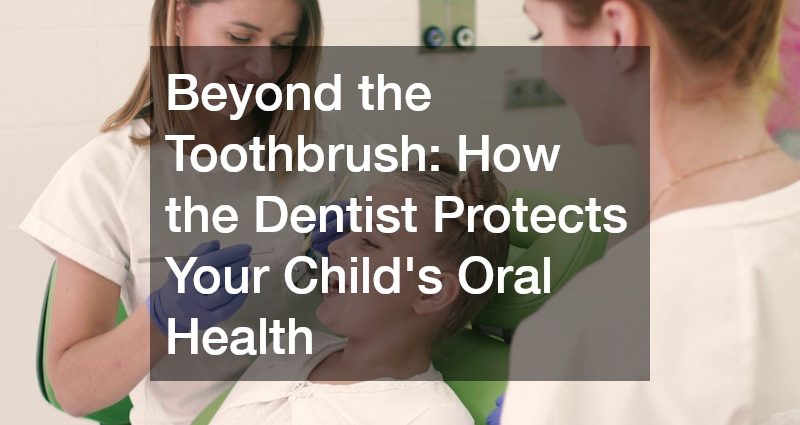
The health of your child’s teeth is not just about regular brushing; it encompasses a wide range of preventive and educational practices only a dentist can provide. Pediatric dentistry plays a crucial role in treating dental issues as they arise and preventing them before they start. This synergistic effort between regular home care and professional guidance ensures a beautiful and healthy smile that lasts.
Promoting the role of pediatric dentists, such as those at Franklin County Dental and Implants, is essential for the oral well-being of every child.
How Often Should My Child Visit the Dentist?
Understanding the Recommended Frequency for Dental Check-Ups
Experts recommend that children see a dentist by their first birthday or within six months after their first tooth appears. This early visit sets the stage for a lifetime of healthy oral habits and ensures that any potential issues are addressed as soon as possible. Regular check-ups are typically advised every six months, but may vary based on individual needs.
The primary goal of these visits is not only to check on the teeth but to monitor the overall development of the mouth and jaw. Catching developmental issues early can be crucial in guiding the best course of preventive or corrective action. These visits also provide opportunities for children to become comfortable with dental care routines.
The frequency of your child’s dental visits might change depending on specific factors such as their oral health, habits, and growth patterns. Certain situations, like a tendency toward cavities or malocclusion (misaligned teeth), might necessitate more frequent visits to ensure comprehensive care and monitoring, emphasizing the tailored approach needed in pediatric dentistry.
The Importance of Routine Dental Visits for Preventive Care
Routine dental visits serve as a frontline defense in preventive oral healthcare. Dentists conduct thorough examinations to spot early signs of decay or gum disease before they progress into more serious problems. Early intervention can make all the difference in maintaining dental health, saving time, money, and discomfort down the road.
Apart from preventive measures like cleanings and fluoride treatments, routine visits are crucial in reinforcing good oral hygiene lessons. During these visits, children receive guidance and motivation to maintain optimal oral health practices at home, making these appointments invaluable for lifelong dental care. Familiarizing children with the dental environment also reduces anxiety and fosters a positive perception of dental visits.
Besides detecting problems early, these visits are an opportunity for parents to discuss any concerns they might have about their child’s oral health, diet, or habits. Open communication with the dentist can lead to personalized advice and strategies to improve and maintain oral hygiene, promoting a continuous partnership between families and pediatric dentists.
Factors Influencing the Frequency of Dental Appointments
Several factors can influence how often a child should visit the dentist. A child’s age and developmental stage often dictate different needs and concerns. For instance, toddlers and preschoolers might require more guidance with brushing techniques, while older children may need more attention to orthodontic assessments or sports-related dental issues.
Children with chronic health conditions or special needs may require more frequent visits to address specific challenges and tailor preventive care plans. Dentists are skilled in adapting their approach to meet the diverse needs of individual patients, ensuring all aspects of oral health are covered.
Diet and lifestyle can also impact the frequency of dental appointments. A diet high in sugary foods and drinks can increase the risk of cavities, necessitating more frequent monitoring and preventive measures. Furthermore, habits like thumb-sucking or tongue-thrusting might lead to orthodontic concerns that benefit from a dentist’s early intervention, underscoring dentists’ comprehensive role in maintaining oral health.
What Treatments Do Dentists Provide for Children’s Oral Health?
Cavity Prevention and Treatment Options
Cavity prevention is at the forefront of pediatric dental care. Dentists use a variety of treatments and strategies to prevent cavities, such as fluoride applications, which strengthen enamel and make teeth more resistant to decay. Sealants are another preventive measure, applied to the grooves of back teeth to prevent food particles and bacteria from accumulating.
When cavities do occur, fillings are the most common treatment. Dentists use a range of materials, including composite resins, to restore the tooth’s structure and function. Catching cavities early during regular check-ups means they can be treated with minimal intervention, emphasizing the importance of early and preventive care in maintaining oral health.
Beyond fillings, pediatric dentists are skilled in educating families on dietary choices and oral hygiene habits to minimize cavity risks. Understanding how these factors interplay allows dentists to provide tailored advice, ensuring parents have the tools and knowledge needed to support their child’s healthy development.
Orthodontic Assessments and Recommendations
Pediatric dentists play a significant role in assessing the need for orthodontic intervention. Early orthodontic assessments help identify potential alignment issues, such as crowded teeth or bite problems, which can affect not only dental but also overall health and self-esteem.
By evaluating the growth patterns of the jaw and teeth, dentists can determine the need for early orthodontic treatment. Early intervention can make future treatments less invasive and more effective. Dentists collaborate with orthodontists to develop comprehensive treatment plans tailored to individual needs, optimizing outcomes.
Regular monitoring of development and changes in the dentition allows for timely recommendations, guiding parents and children through the process with confidence. It’s an integral part of pediatric dentistry that helps set the stage for a healthy and well-aligned smile.
Conclusion
Pediatric dentists play a vital role in protecting children’s oral health through preventive care and education. The collaboration between parents, children, and dental professionals fosters healthy habits and a positive dental experience.


